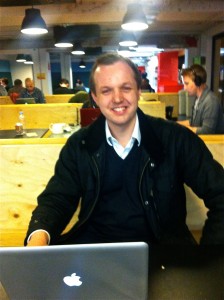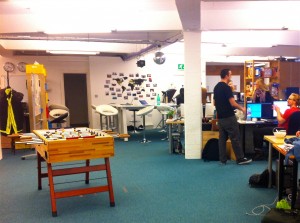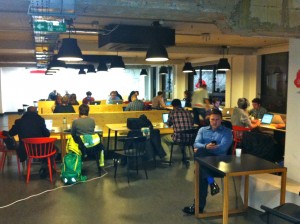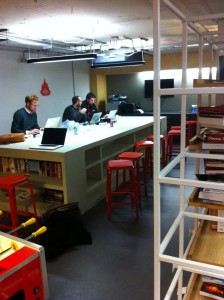Witnessing the start-up revolution in London’s Techcity
I took my usual trip to London this week for an ISBE trustee board meeting, held this time in London Metropolitan University’s incubator in Shoreditch. We were there as guests of NACUE who work to support enterprise societies and student entrepreneurship, so it was fitting that afterwards I was able to take up invitations a number of exciting small start-ups and incubators in this part of London known as the Silicon Roundabout or Techcity. A number of stories have recently emerged on television news and in government statements about the importance of this small section of the UK’s capital city in the economic downturn and relative decline in importance of the finance sector.
My first visit was to the headquarters of Mendeley where high-tech start-up speak rubs shoulder-to-shoulder with academic publication strategies. My taxi dropped me off at the top of a non-decscript alley at the end of which was a whitewashed wall with a sparkling glass doorway. Here inside this industrial building regenerated into a bright collaborative working space, I was greeted by wall-to-wall energy of young tech startup workers furiously coding, while polished community officers greeted with infectious. enthusiasm. Mendeley offers a whole new take on how academics organise their reading and bibliographies in a form which puts researchers and their communities first. They were clearly excited about their offering and it was fascinating to hear that their financial backers were situated just upstairs in a community workspace. I came, I saw, I went home with the t-shirt (literally).
Next stop was the big event; Google Campus. There has been significant hype around Google’s support for new technology start-ups and rightly so. I went to another regenerated industrial building transformed into collaborative spaces over multiple floors. The ground floor is occupied by Google Campus themselves, a form of corporate social responsibility which aims to support start-ups, where all the key events take place; free to members of their online and offline community. Other floors are occupied by incubator organisations such as TechHub and Central Working, the latter of which is perhaps better defined as a provider of co-working space for startups at different stages of development in beautifully designed loft spaces and cafe’s. Not only that, but their members get direct access to mentors and opportunities to pitch to investors for funding in the same location, as well as access to branches in the USA. The key reason for locating these different support and event organisations together seemed simply to be to create a campus community of start-up founders, who have the opportunity to rub-shoulders not only with the variety of event speakers and investors, but also simply with each other. In each of the spaces I visited, noticeboards were stuffed full of requests and offers of help and support, and mini-meetings took place on moveable furniture, while everywhere enthusiastic faces pounded away at keyboards, each intent on the next big thing.
All in all, the excitement and energy was palpable. But why is this happening now and why in a, frankly, non-descript part of London? As a colleague commented to me ‘Silicon roundabout looks pretty dull and smells of kebabs.’ But it’s down the alley ways an in old factory buildings that the excitement is happening, through coded doors and behind bored security guards. And the impact seems to be everywhere too, as between the takeaways and dusty office blocks, new trendy cafes, bars and designer bicycle shops are springing up to serve the needs of a tired tech founder after a hard day’s coding.
It seemed clear then why government members and the London mayor are keen to show their support for what’s happening. In the current economic climate, where the finance sector is losing the mantle as the main economic force in London, these new startups are seen as the potential future sources of growth. How well the established digital businesses are at sustaining that growth beyond initial funding, during an economic downturn, remains to be seen - but if the energy at work is anything to go by, the start-ups and their teams there are certainly ones to watch.
 One thing that I particularly took away from the visit was the importance of great design, as the pictures here show. This wasn’t simply about aesthetics, but was also about the ways in which opportunities were created for the specialists in different disciplines to come together and develop new ideas. The people pointed out to me in my tours weren’t just web designers and mobile developers, they were fitness instructors and music label owners - many industries now use technology to develop opportunities. These kind of collaborative activities were wonderful to see, particularly as we employ a similar model with our courses at Leeds Enterprise Centre, bringing together students from across disciplines to work together, as well as using the resources across the university and the support of alumni entrepreneurs and investors - something we’re excited to build on for the new MA Fashion, Enterprise and Society next year with the School of Design as well as our very own MSc Enterprise.
One thing that I particularly took away from the visit was the importance of great design, as the pictures here show. This wasn’t simply about aesthetics, but was also about the ways in which opportunities were created for the specialists in different disciplines to come together and develop new ideas. The people pointed out to me in my tours weren’t just web designers and mobile developers, they were fitness instructors and music label owners - many industries now use technology to develop opportunities. These kind of collaborative activities were wonderful to see, particularly as we employ a similar model with our courses at Leeds Enterprise Centre, bringing together students from across disciplines to work together, as well as using the resources across the university and the support of alumni entrepreneurs and investors - something we’re excited to build on for the new MA Fashion, Enterprise and Society next year with the School of Design as well as our very own MSc Enterprise.
Finally, the importance of design and collaboration in developing start-ups and changing the face of a traditionally poor part of London echoed with my own research interests in applying different disciplinary perspectives to entrepreneurship research. We’ll be building on this theme in an exciting international research workshop in March next year here in Leeds: Advancing European Traditions of Entrepreneurship Studies. I think the gauntlet has been laid down to see how we can integrate collaboration, cross-disciplinary working and a little technology in the workshop to make things even more interesting...



